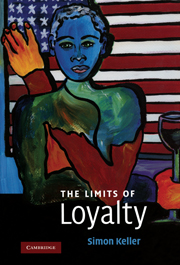Book contents
- Frontmatter
- Contents
- Preface
- Acknowledgements
- Chapter 1 What is loyalty?
- Chapter 2 Friendship and belief
- Chapter 3 What is patriotism?
- Chapter 4 Against patriotism
- Chapter 5 Filial duty: debt, gratitude and friendship
- Chapter 6 Filial duty: special goods and compulsory loyalty
- Chapter 7 Is loyalty a value? Is loyalty a virtue?
- Chapter 8 Communitarian arguments for the importance of loyalty
- Chapter 9 Josiah Royce and the ethics of loyalty
- Chapter 10 Disloyalty
- Conclusion
- Postscript: universal morality and the problem of loyalty
- Bibliography
- Index
Preface
Published online by Cambridge University Press: 22 September 2009
- Frontmatter
- Contents
- Preface
- Acknowledgements
- Chapter 1 What is loyalty?
- Chapter 2 Friendship and belief
- Chapter 3 What is patriotism?
- Chapter 4 Against patriotism
- Chapter 5 Filial duty: debt, gratitude and friendship
- Chapter 6 Filial duty: special goods and compulsory loyalty
- Chapter 7 Is loyalty a value? Is loyalty a virtue?
- Chapter 8 Communitarian arguments for the importance of loyalty
- Chapter 9 Josiah Royce and the ethics of loyalty
- Chapter 10 Disloyalty
- Conclusion
- Postscript: universal morality and the problem of loyalty
- Bibliography
- Index
Summary
We all have loyalties; think of some of yours. Probably, many of your loyalties are to other people: your friends, for example, and perhaps your colleagues, parents, children or romantic partner. You might also be loyal to certain institutions, like a university or a political party; or to your favorite brands or shops or restaurants; or to your pets, your country or your profession. Some of your loyalties, probably, are very important to you, playing a major role in your life and your self-conception; examples might be your loyalties to your spouse and children. Others, while having their place, probably do not seem quite so important: your loyalty to a local coffee shop, say, or your loyalty to your favorite football team.
If you are loyal to something, then you probably favor it, in one way or another, in your actions. You might promote its interests, treat it with respect or veneration, follow its orders, or act as its advocate. But loyalty is not just a matter of how you act; it is also a matter of how you think, and how you are motivated. If you are loyal to something, then thoughts of it may inflame your passions, it may be something towards which you feel warmth and affection, and you may be saddened by thoughts of its suffering or demise.
- Type
- Chapter
- Information
- The Limits of Loyalty , pp. vii - xiPublisher: Cambridge University PressPrint publication year: 2007



